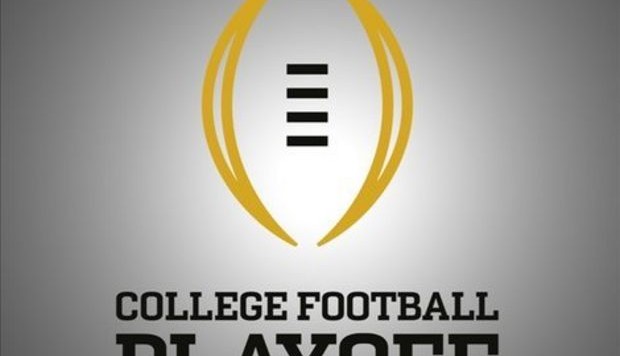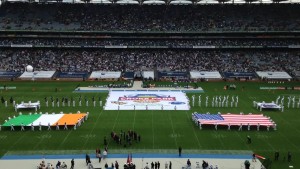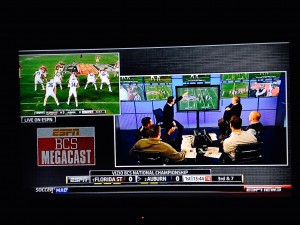Monday, in part one of this college football media roundtable, Awful Announcing editor Matt Yoder and Student Section editor Matt Zemek were joined by two Student Section writers: columnist Allen Kenney and contributor Kevin McGuire. The panel discussed the new configurations of on-air talent across multiple shows, such as College GameDay, College Football Final, and various game broadcasts.
We now turn to part two of our roundtable, on various programming and scheduling issues which affect the presentation and quality of college football on television. Mr. Yoder and Mr. Zemek are joined by the team which produces the roundtables you see during the latter portion of each week at The Student Section. (Note: They’ll move to Monday once the season begins.)
TSS associate editors Terry Johnson and Bart Doan, plus senior writer Kevin Causey, complete our panel.
*
1. In light of the way the 2015 College Football Playoff rankings shows led to the final outcome on the Sunday after all (non-Army-Navy) games had been played, are you going to change the way you watch these shows during the season? What should ESPN’s play be, if anything, in terms of how this season’s broadcasts are handled?
Matt Yoder
On Twitter: @myoder84
If last year proved anything with the Baylor-TCU debacle, it’s that the weekly CFP rankings shows are worthless. They don’t mean anything because the rankings the entire season can randomly change the final week given the committee’s votes. That’s no fault of the committee, really, but of ESPN forcing a weekly rankings down our throat so we still have some debate to embrace. Ideally, ESPN would forego the dog and pony show and just televise the only rankings that count. But because we need something to argue about, we’ll do the weekly rankings with a wink and a nod knowing they are completely meaningless.
Bart Doan
On Twitter: @TheCoachBart
Full confession: I didn’t watch a single episode. To me it was nothing more than sensationalism aimed at driving public rage and commentary on social media. In the end, they got it right, so as long as the meal tastes great, who cares if the cook looked like he’d never operated a grill for most of the day.
As Matt Y. said above, in the end it was meaningless. So does that mean it was all a show to drive commentary and in the end they knew all along they’d do the right thing, but ESPN wanted/needed the rage of biased-looking rankings? Or do conference titles mean that much? Or is that a convenient guise? Scrap the thing. It sucks, and I don’t even need to watch it to tell you that.
Terry Johnson
On Twitter: @SectionTPJ
I didn’t watch a single episode. It was more fun to go on Twitter to watch people overreact to discuss the standings rather than listen to the talking heads at ESPN try to guess why Team A was ranked in front of Team B.
That’s not going to change anytime soon. In fact, the only thing that would make me tune in, is if the Selection Committee were to answer specific questions about specific teams rather than the “we looked at the team’s whole body of work” canned response that we get now. As soon as the committee is willing to candidly answer questions about why one team is ranked in front of another, I’ll happily watch every second of the show, and encourage others to do the same.
Until that happens, I’d rather watch Curious George re-runs with my kids.
Kevin Causey
On Twitter: @CFBZ
I didn’t watch the College Football Playoff rankings shows last year and I won’t start watching them this season. In my opinion, they are a waste of my time.
Matt Zemek
On Twitter: @SectionMZ
I won’t say “most,” but certainly many college football analysts have still not appreciated one specific component of last year’s series of playoff rankings.
When TCU crushed Iowa State on the final weekend yet moved down to sixth, many bloggers felt that was appropriate, since Baylor beat a Kansas State team which was far better than Iowa State. For them, the idea that TCU should not have fallen multiple spots in the rankings was “the old poll-based philosophy” at work. I get that, but this subset of bloggers missed two key details:
1) Unlike most conference schedules, the Big 12 schedule is the same for every conference team. TCU had already beaten Kansas State, and Baylor had already beaten Iowa State. In other words, it’s not as though Baylor gained something TCU lacked when it beat KSU — TCU had already done so, and moreover, TCU beat KSU by a larger margin than Baylor did. Similarly, TCU beat Iowa State by a larger margin than Baylor did. Reasonable people could have put Baylor ahead of TCU, but saying TCU should have stayed above Baylor did NOT necessarily represent “the old poll-based philosophy.” If you were grading TCU and Baylor based on cumulative resumes, those final-weekend results added something to Baylor’s resume, but they made TCU look better on a larger level. If you were judging a 12-game resume, TCU should not have fallen three spots (from 3 to 6) and below Baylor.
This leads to:
2) The College Football Playoff Selection Committee never did say — with the clarity and simplicity the situation demanded — “Baylor finished ahead of TCU for fifth because of the head-to-head tiebreaker.” The issue was not resolved with the directness and plainness the moment deserved.
This has been a longstanding problem in college football: viewing conference ties through a national lens (i.e., using a BCS mechanism to “break” conference ties such as the 2008 Big 12 South and the much-less-publicized 2010 Big Ten, with Ohio State, Wisconsin, and Michigan State). What happens in a conference is a local issue: You beat your conference opponents head to head, you win a conference tiebreaker. National disputes are poll- or formula-based. Local disputes are head-to-head based.
The CFBP Committee, IF it was always going to value Baylor’s head-to-head tiebreaker over TCU, should have been listing Baylor ahead of TCU in the rankings every week. After all, when you list two teams in the conference standings during a season, you naturally (and always) list the team with a head-to-head win or any tiebreaker advantage first. You list the team which loses the tiebreaker second in the standings.
Putting TCU not just ahead of Baylor in the next to last week of the season, but THIRD, multiple spots ahead of the Bears, conveyed a clear belief that TCU’s resume surpassed Baylor’s by a large margin, AND that head-to-head was just one of many factors, not THE determining factor in settling the Baylor-TCU issue.
I had no problem with Ohio State making the playoff, but when TCU finished behind Baylor at 6 (with the Bears being 5), that told me the series of playoff rankings revelations was toying with the public and was never intellectually or materially serious.
You will not see me watch these shows in 2015. Fool me once, shame on you. Fool me twice… we know how that goes.
*
2. What one thing should College GameDay do better than it has — in 2014 or on a long-term basis (or both)?
Terry Johnson:
Given College GameDay’s track record, my main advice would be, “keep doing what you’re doing.” The fact the show has morphed from a one-hour in studio program into an iconic event where people camp out for days in order to be there speaks volumes about how successful it is. There’s no need to make any sweeping changes.
With that said, I’d like to the show do two things differently.
First, GameDay should stop visiting FCS schools. Yes, it sounds nice to say, “let’s give the little guys their moment in the sun.” However, it should not come at the expense of the non-Power 5 conferences like the Sun Belt, which has yet to host an episode of the show. I’d rather see College GameDay visit Arkansas State, Georgia Southern, Appalachian State, or Louisiana-Lafayette in a “win or go home” Sun Belt game than a matchup from the Ivy League, which does not participate in postseason play.
So would most people who have ever attended a game at one of the venues listed above.
The other change that I would make to GameDay is that I’d make the show take a deeper look at more games. While the coverage they provide for the top games of the week is impressive, the “lesser” games don’t receive nearly as much attention. With the amount of former coaches and players the network has on its roster, it could actually bury the competition with some X’s and O’s sessions.
Kevin Causey:
One of the reasons I don’t watch much of College GameDay is because, to me, they don’t provide a lot of thoughtful analysis of the games of the weekend. I would like to see more in depth analysis of the game. College GameDay is more about the sizzle than the steak. Maybe they could add a coaches corner where they have someone (who has recently been a head college coach) break down some film on a game and give insight as to what they feel will happen and why. College GameDay is about entertainment so I don’t expect much to change.
Matt Zemek:
GameDay, go to more places that don’t ordinarily get to host the show. Go to a MAC location. Go to a Sun Belt location. The big games need your presence, but there are several weeks on the slate that do not have a giant matchup. Use those weeks to show you care about the entirety of the FBS, not just the Power 5. Such a move will be a winner in the court of public opinion and buy ESPN a measure of goodwill.
Bart Doan:
Again, either I’m over-qualified to answer this because it isn’t striking a chord with me … or totally under qualified because I don’t watch it and thus cannot comment … but I haven’t watched College GameDay in well over a decade. Absent the fact there’s too much else to do before watching football for the better part of the day, I don’t trust ESPN’s coverage of basically anything, and I find no use in watching garble that adds no value to my time. So the long-form answer is: ESPN needs to drop the E and be a little more trustworthy in how they cover things, which means they’d lose money in certain areas, which means it’ll never happen, which means it’ll be two decades of no watching soon.
Matt Yoder:
Like Zemek, I’d like to see GameDay go to some new and different locations. One of the reasons why ESPN’s SEC bias talk has gotten so strong in past years is because GameDay has spent a ton of time on the SEC, and the majority of schools they’ve visited have been SEC schools. The SEC has deserved to be top dog on the basis of their championships the last decade, but it’s been overkill in recent years (especially the last two, when they haven’t won it all). Spreading the wealth a little bit to other teams and conferences with their presence and their coverage couldn’t hurt.
*
3. If you look at Thursday and Friday schedules over the past several years, the number of games is gradually increasing on these nights. Is this a good thing for college football?
Kevin Causey:
I think it’s good for the fans and it’s good for college football. More football on more nights gives fans a chance to get their eyeballs on a lot of different teams. If all games are on Saturday, you are limited to what you are going to watch due to time limitations. Yes, you can DVR the games, but are you really going to go back and get heavily invested in a game on DVR (unless it’s a team you are a fan of)?
Another thing to look at is the spotlight that it gives teams that wouldn’t normally get the spotlight. Games between two teams outside the top 25 won’t get watched on Saturday, but put it on a Thursday and suddenly it’s must see TV. This helps teams and schools get out into the spotlight instead of getting buried. Certain conferences and schools have definitely benefited from Thursday/Friday schedules, and I believe this should continue.
Matt Zemek:
It’s great that more games get their own stand-alone time slots, without getting buried in the Saturday avalanche of contests, so in that sense, this development is good. However, it speaks to the extent to which college sports are even more of a sprawling, pervasive entertainment product. This isn’t inherently good for college football, but if playing on more weeknights or at more odd hours (which we’re going to see more of, not less, as we move forward) leads to other (off-field) reforms of various kinds, this shift will have been fruitful to a certain extent.
Give college football this, too: At least when it schedules Thursday games, teams are usually coming off byes. It’s crazy that the NFL, in 2014, still did not get that.
Matt Yoder:
It’s the same phenomenon in the NFL, isn’t it? If Roger Goodell wanted to, he could probably have a nationally televised game every single night of the week. And why not? We are a football-obsessed nation. So if there’s games on any night of the week, as a football fan, I’m not going to complain. Aside from having more football to watch, it also gives an opportunity for teams that don’t get a lot of attention on Saturdays to have a night to shine. Mid-week football has brought us the blessing of #MACtion, so it can’t be a bad thing, right?
Bart Doan:
If people are going to watch, it’s a good thing. From a student-athlete perspective, I don’t know that it alters their routine too much. Usually teams playing on Tuesday/Thursday have a bye the previous week. I do wish they’d take advantage more of Friday nights. That’s a HUGE untapped oil well in my opinion. Bars and restaurants are packed. For a lot of the folks watching, they have the next two days off. Big Friday night games would drive even more folks to those watering holes or eateries. Plus, as Matt Y. said, you get some teams on the tube with all of the eyeballs focused on them that otherwise wouldn’t get that exposure. Look at what the “any day, any time” logic did for Boise State. I do think, however, that the NFL racheting up their Thursday night game package has put a dent in the enthusiasm for college football on that day, because even a chuckle nut like Roger Goodell can’t screw the NFL up right now.
Terry Johnson:
As a general rule, Thursday and Friday night games are good for college football. These contests provide plenty of national exposure and give the teams from the smaller conferences to show what they can do on the big stage.
However, I would like to see a change made with regard to the schedule. Given that football’s a physically demanding sport, teams should not be allowed to play two games in the same calendar week.
That’s probably not going to happen. After all, a number of rivalry games take place on the Friday after Thanksgiving. Since some conferences – most notably the SEC – forbid teams from taking the preceding week off, teams have no choice but to play more than twice in seven days.
While doing that every once in awhile isn’t a bad thing, it could have negative consequences for teams that do it repeatedly. I don’t envy Appalachian State, which has to play its biggest two games of the season this year on just five days rest.
*
4. Another year, another occasion to ask this question: If you’re at Fox Sports 1, what should you do to attempt to become more competitive as a college football broadcaster — you get 3 items to recommend, and you cannot rub a genie lamp and/or wish for additional items.
Terry Johnson:
1) DON’T TRY TO REPLICATE COLLEGE GAMEDAY. Your top competitor got to where it was because it’s created a unique service that people are interested in. Any attempt you make to clone that success is just going to make people say, “They’re just copying GameDay.” Instead, innovate and create a product that’s so unique that it pulls people away from ESPN.
2) To make the product unique, go deeper into every game that’s on your schedule. Be sure to bring in plenty of former players and coaches to discuss X’s and O’s for every contest on the docket, especially the smaller conferences. This will help you lure hardcore football fans from ESPN, many of whom have complained that the show is more “fluff” and less football these days.
3) See Mr. Yoder’s first point. That would level the playing field almost immediately.
Matt Zemek:
1) FS1, notice how fans love ESPN’s MAC Wednesdays and Sun Belt Tuesdays? Pursue those slots in the future for the conferences you broadcast. Try to go away from head-to-heads with ESPN’s featured Thursday night games. Go for more games in which you get a broadcast window mostly or entirely to yourself.
This leads to:
2) Breakfast football on Saturdays. Of course a C-USA school such as Old Dominion would love to showcase its program with a 10 a.m. local time game which you could air opposite GameDay on ESPN. People would tune in. It’s football.
3) Talk to Larry Scott and the Pac-12. Make a game in Australia or Tokyo happen. Be aggressive in pursuing a game that would run somewhere from 1 to 3 in the morning. Talk to people in Europe about a game that could run at 8 Eastern overseas. Be the network which trots out a college football season-opening marathon from late Thursday night through late Friday morning in week one of the season. Make a splash. Use game inventory to make more of an impression on viewers; don’t think that talk-fests or personalities are your ticket to a better future.
Matt Yoder:
1) Write a blank check to the Big Ten. The Big Ten is the last big fish out there as far as media rights go into the next decade. Get those rights exclusively and you’re immediately a player in college sports. Split them with ESPN and you’re still on the periphery. It’s going to cost a lot, but it’s something FS1 should really try to do with all their might to establish themselves.
2) Be innovative in your scheduling. Viewership is driven by live sporting events and right now, FS1’s college football options are often way down the pecking order on Saturdays for viewers. So what can you do? Go where the competition ain’t. Early morning football, Wednesday night football, late night football. Whatever you can do to schedule a game that’s the only one in town, do that.
3) You said I couldn’t ask for more wishes, right? And I can’t buy the College Football Playoff from ESPN and trade it for Fox News? Dang…
Kevin Causey:
1) Fire Colin “Blowhard” Cowherd. Seriously, that guy is awful. He’s a talking head and isn’t going to add anything to their college football coverage. I realize he hasn’t even had a show yet, but is he REALLY going to bring fans to their product?
2) Hire Lou Holtz and Mark May. This goes against my Colin Cowherd stance, but Fox should sign these guys and give them a “College Football Final” type show. Many complained about these two over at ESPN, but I would wager that casual fans liked them a lot more than what I perceive to be a vocal minority. May is still with ESPN/ABC, but if Fox could get these two guys in a wrap-up show, I think it could grab some decent rating compared to what FOX is used to getting in that time slot.
3) Do a show that focuses on detailed analysis of games. ESPN flies through games on their wrap-up shows. Fans are lucky to see 30 to 45 seconds of their game on TV. Take the big five conferences and devote more time to discussing the games and showing highlights from them. Essentially… provide more steak than sizzle.
Bart Doan:
More confessions: I’ve never watched more than 5 minutes of Fox Sports 1 pregame coverage, and the 5 minutes was total accident. But if they wanted my viewership, here you go:
1) Fan Casts: Three trivia questions over the course of their pregame programming, answered correctly, entered into a drawing to call a game from the booth … live … with a fan of the rival team, and it goes on a FSR channel. The name of the game right now is interactivity. Everyone has a voice and they want to use it, right or wrong. Can you imagine a Michigan and Ohio State or an Alabama and Auburn fan in the booth calling their rivalry games and on social media talking at the same time? Wish I had the money to get something like this started.
2) Friday Night/Saturday Morning Games: both windows are totally untapped. I went in above on how Friday is a gold mine waiting to be tapped. So is Saturday morning. Folks got so excited with the games in Ireland because … hell … you wake up and football is on. Why do you think the NFL is experimenting so hard in London? It’s another window to dominate, weekend mornings. Follow the NFL’s lead.
3) Buy the Pac-12 Network and hype that conference, a la ESPN and the SEC. The Pac-12 is on the come. It’s quietly been the best conference in college football the last few seasons overall, and the Pac-12 Network’s odd self-immolation strategy isn’t working. FS1 should purchase the whole damn thing, get it on a main cable package a la the Big Ten Network (which they own 51 percent of) and the SEC Network, and raise the profile of that conference. There will be many playoff-influencing games in that conference over the next several years. Get on board now.
*
5. Your number one beef/complaint with college football scheduling overall is _________?
Bart Doan:
From a broadcasting perspective, scrap Thursday night football. I got the point before the NFL started out-drawing college football with basically … the most awful football the NFL had to offer every Thursday, but you can’t take on that league right now. They don’t care what is on, when it’s on, wherever it’s on … they’re getting the eyeballs. Try to focus on a window where the NFL won’t touch for some of those bigger Thursday night games, because even though the NFL’s product on that night consistently sucks because players aren’t getting enough time to prepare physically … it’s still out-drawing even a big college game.
Matt Yoder:
This one is easy — the semifinals on New Year’s Eve. Forget college football, this is one of the worst scheduling ideas in the history of sports. Not only are you cutting the tradition of the New Year’s Day bowl games at the knees by playing the important games the day before, you’re cannibalizing your own audience. There’s a reason nobody has ever scheduled big sporting events on December 31, ya know. How anyone agreed to this schedule 2 of every 3 years will never make sense… Until you realize the big bowls and big dollars still run the sport.
Matt Zemek:
It’s still the lack of staggered start times. I realize that games need to be fitted in around other programming, and that various contracts require balancing acts in terms of time slots, but it remains terrible that the night window and the 3:30 window put three feature-level games that start basically at the same time. One-hour staggers of these games, and also having significant games in the (never-used) 1:30 Eastern and (rarely-used) 5:15 Eastern slots, would enable viewers to see more fourth quarters of more showcase games.
Kevin Causey:
People complaining about it. By the end of the year, the bad teams will move to the back and the good teams will move to the front. Scheduling is never going to be fair and just across the board. My number one complaint about college football scheduling is those that complain about it. Stop complaining, watch the games, and enjoy the games.
Terry Johnson:
I’ve got two major complaints about scheduling.
First, no team should play two games in less than a week. Football’s a physical game and players need time to recover from the rigors of an afternoon/evening on the gridiron.
The second point is something Matt Z mentioned: staggering the start time. While I don’t recall the exact number, it seemed like more times than not every meaningful college football contest was on at the same time. How would anyone – whether it’s a lowly sports blogger or a member of the Selection Committee – possibly watch every important football game, if they’re all on at the same time. I’d rather see the top games spread out throughout the day to keep people talking about college football.
*
6) What’s one college football-centric broadcast innovation you’d like to see incorporated into the games you watch on a regular basis?
Matt Yoder:
I’d love to see the BCS/CFP Megacast used on a more regular basis, across college football and across the sports world. That’s one of the coolest broadcast innovations in the past decade and it’s kind of a shame it’s just limited to one game a year.
Terry Johnson:
I love the idea of the Megacast every week, especially with the announcers. As a longtime fan of the Atlanta Braves, I always turned off the TV volume when the Bravos were on ESPN because I wanted to hear legendary broadcaster Skip Caray call the game. College football fans should have the same option when tuning into cheer for their favorite team.
Aside from that, I have nothing really to add. While there are a couple of commentators that I mute every time they call a game, the broadcasts themselves are loaded with stats, the scores update quickly, and technology — especially the first down line — is fantastic.
It’s tough to argue with that.
Bart Doan:
I know no one would go for this, but for reviews, I’d love for there to be some sort of way to broadcast the audio conversation betwixt the review official and the on-field official. Folks railroad referees but never know the difficulty of the conversation being had during a reviewed play. The audio would really give an insight into what type of conversation is being had when a game-changing play is about to be upheld or overturned. It also might be good for officials, since folks would be able to hear how they’re viewing a play over assuming they can’t see what’s actually going on. It’d humanize the process a great deal.
Kevin Causey:
It’s not really an innovation, but more a point of emphasis on broadcasts: I’d like to see more stats. As a kid I was always a huge fan of the box score. In this day and age, we have so many stats available; TV broadcasts should use them better. I would like to see something like a “stat box” in the bottom left hand corner of the screen. This can be used to highlight stats from each team for how they do in the situations they face in real time. Example: If it’s third down, show me the team’s third down conversion percentage for the yards they have to gain. College football is a stat driven game, and the more stats, at least for me, the better.
With stats going up after every play, the broadcasters would have the ability to discuss them or not, depending on how the game was going. This way we don’t end up with Mike Patrick discussing Britney Spears on live TV.
Matt Zemek:
ESPN seems to be making progress on the pylon camera for goal-line reviews. This leaves cameras on the bottoms of each upright for the clear adjudication of field goals. At least in the Power 5 conferences, and for select games outside the Power 5 (involving teams such as Notre Dame, Boise State, Cincinnati, Navy, Memphis, Houston, and others), this technology should be able to make its way into college football. This is a billion-dollar industry. Let’s see the technology match the other outpourings of resources into this product.
If it means that ESPN has to air more games without on-site announcers in the name of cutting costs, so be it. We need announcers for the big games, but we don’t have to have them at all costs for the lesser ones. (Heck, tennis fans wouldn’t mind if announcer-free broadcasts existed as a matter of course. It’s puzzling that fans of other sports haven’t yet caught on to that notion.)





